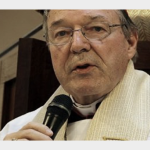Catholic Church Delivers ‘Low Blow’ to Avoid Responsibility for Child Sexual Abuse

The Catholic church has delivered what’s been described as a ‘pretty low blow’ in order to avoid paying compensation to survivors of childhood sexual abuse.
The Marist Brothers is arguing in court that it is unable to defend civil proceedings brought by a survivor of child sexual abuse, who is known by the pseudonym of Mark Peters, because his abuser has died.
Mr Peters asserts he was abused by notorious child sexual offender, the Marist Brothers’ Brother Francis Cable from at least 1967, and that the organisation failed in its duty of care to prevent the abuse by failing to terminate his position let alone reporting the matter to police, despite having received multiple reports of abuse.
Brother Francis Cable – imprisoned for serial child sexual assault
Rather than taking action against the abuse, the Marist Brothers “shuffled around” Brother Cable to new locations when the complaints surfaced.
Indeed, this has been the “solution” offered by many Catholic organisations upon receiving reports of child sexual assault.
Brother Cable was eventually found guilty and sentenced to 16 years’ imprisonment in 2015 for sexually assault 19 boys at Marist Brothers schools in Maitland, Hamilton and Pagewood between 1960 and 1974.
In 2019, while still serving his original sentence, he was ordered to serve an additional eight years behind bars for crimes against a further five victims.
Catholic Church continues to do all it can to avoid liability
Cable died in September last year, amidst fresh allegations of indecent assault.
And rather than work with survivors and make reforms, Marist Brothers is using the opportunity in an attempt to shirk its legal obligations.
The tactic has angered survivors, who repeatedly see the Catholic Church ignoring their pain and finding legal tactics to avoid having to acknowledge survivors and pay compensation.
The Catholic Church certainly has the funds to pay compensation. Last year it was reported that the Church’s Insurance was boosted by almost $170 million to prepare for massive payouts in historical sexual abuse claims.
According to some plaintiffs, the Church is relying on a ruling which was made in New South Wales in 2022. The ruling determined there could not be a fair trial if the accused person was dead, and could not provide information or a statement to defend the accusations.
The background is this: In June 2022, The Lismore diocese of the Catholic Church argued successfully for a permanent stay of proceedings over a civil claim brought by a woman who alleged she was 14 years old when she was sexually assaulted by Father Clarence Anderson in 1968 inside her family home.
Documents tendered to the court made it clear that the Church knew that Father Anderson was abusing boys for a number of years prior to the woman’s alleged assault.
Despite the history, and the evidence tendered in court, the Church made two attempts to have the case thrown out because, it argued, the woman had only complained about the sexual assault after Father Anderson died in 1996, which left them unable to investigate, to ask him questions, and this would make any subsequent trial unfair.
Initially the Supreme Court rejected the Church’s application for a permanent stay of proceedings, but the decision was overturned in the Court of Appeal which ruled that, “Although Father Anderson is not a defendant, he is a critical witness. Father Anderson died in 1996, ‘before the Lismore Trust was on notice of the allegations’ and therefore ‘the Trust did not have an opportunity to confront him with the detail of the allegations and obtain instructions for the purposes of its defence, and nor will it be able to call him as a witness if it so chose.’
Implications for victims
It is a ruling that has serious implications for survivors and the intent of the Child Abuse Royal Commission which was to give victims a voice, and to have their complaints redressed – fairly and swiftly.
The Royal Commission also acknowledged that sexual abuse complaints often take decades to emerge. Statistics show that the average time of reporting childhood sexual abuse from the time of the first incident is about 33 years, which is why after the royal commission, many jurisdictions enacted the removal of the statute of limitation for civil claims (time limitations for bringing cases to court) in cases of childhood sexual abuse.
In fact, many allegations are made after the death of perpetrators – it can be a defining moment that acts as a trigger for some to finally feel safe telling their stories.
It’s critical that this is given appropriate weight in court decisions, so that victims can maintain faith in the justice system, and trust the process, which in a significant number of cases is less about financial compensation, and more about the personal process of addressing the pain, trauma, shame, guilt and life-long damage caused by childhood sexual abuse.







